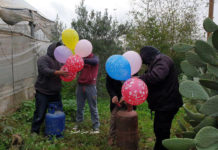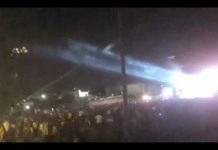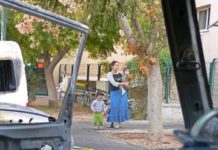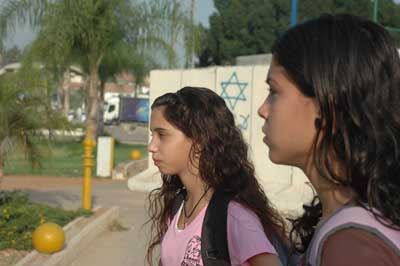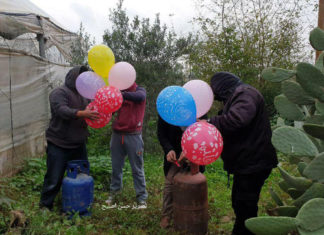In these days, as missiles are continuing to be fired towards Sderot, the Western Negev, and southern Israel, the Sderot Media Center is reexamining the term of anxiety. Due to the IDF’s operation in the Gaza Strip, “Operation Cast Lead”, the anxiety changes in direction and becomes optimistic.
Dr. Adrianna Katz, who has been running the Mental Health Center in Sderot for the past 8 years, is experiencing the missile threat reality for the first time, at her home city Ashkelon.
Our interview takes places at her office in the Mental Health Center. A silver pager lies on her desk, and makes sounds every few minutes. Each sound identifies a different alarm, warning from mortar shells, Grad rockets, Qassams, and other things that threaten southern Israel. A continuous long beeping identifies a mortar attack on the settlements of Eshkol. A single beep identifies an alarm going off in Ashkelon. Between the different sounds, she tells us about the “Qassam Generation” which is growing in Sderot.
Have the anxiety victims’ applications changed since the IDF entered the Gaza Strip?
“For the first time, the residents feel that someone cares about them and provides them with the protection they’ve been expecting for 8 years”. Dr. Katz labels this change as “Optimistic Anxiety”, and explains that now that the IDF is responding to the ongoing missile firing, the residents hope to see a light at the end of the tunnel, and an upcoming change in their life.
Is there a difference between the anxiety of Sderot’s residents and the anxiety of residents of cities and settlements that are new to the missile threat?
“We need to realize what we’re dealing with. The residents who are new to the threat aren’t fully realizing their new reality. They’re just starting to understand what’s going on, and I hope that they won’t experience what we’ve been going through in Sderot for the past 8 years. In Sderot, the population is more disciplined, regarding the protection, the reaction, and the preparation. They are much more trained to deal with the situation. Ashkelon isn’t prepared like Sderot is. I have a personal example: I live in Ashkelon, and I don’t have a protected room at my home. There are a few bomb shelters in the neighborhood, but even if you’re 10 years old and a running champion, you won’t make it there in time. Besides, all the shelters are full and are being used by various groups, such as organizations and synagogues. How can I take cover? In addition to this, I live in northern Ashkelon, which is the favorite target of Grad rockets. My situation characterizes most of Ashkelon’s community”.
One of the important dates that Dr. Katz mentioned is the 19th of June, 2008. At that date, a ceasefire between the Hamas and Israel began. As part of that ceasefire, Hamas had obligated to stop the missile firing towards Sderot and the Western Negev. That ceasefire went on for 6 months, and has officially ended at the 19th of December 2008. The ceasefire was heavily criticized. Intelligential info claims that the Hamas has used the ceasefire to strengthen and arm itself, and that no other terrorist organization in the world had ever managed to do so in such a short time. In addition to that, during the ceasefire, over 415 Qassam missiles and mortar shells were fired towards Sderot and the Western Negev. The term of anxiety has its own rules. Mentally speaking, we can’t distinguish between “relative relaxation” and its violation. Each “Red Color” alarm that goes off increases the feelings of fear, lack of confidence, anger, frustration and humiliation. During that so called “ceasefire”, the Mental Health Center received 250 applications of anxiety victims that required treatment.
Fictitious Relaxation
“I don’t call that period of time ‘relaxation’. I call it ‘fictitious relaxation’, which at some point was more stressing than relaxing, because the people were always alert, expecting for missile attacks. During the calmer days of the “ceasefire”, people were expecting the attacks. When there weren’t any, there were no anxiety victims, but when the attacks did occur, we had nearly 200 anxiety victims.”
Are there any noticeable changes among the anxiety victims, since the beginning of “Operation Cast Lead”?
“Since the beginning of the operation, we received 200 applications. Medically speaking, nothing has changed. However, the anger and desperation components have dropped. There is hope. I would also add the humiliation component, I personally feel it. When the alarm goes off in Sderot or Ashkelon and I stop my car and lie on the road or run for cover, I feel less humiliated”.
“No damage or injuries”- How would you explain the lack of awareness to the term of anxiety victim?
“It’s easier to photograph blood than to photograph the soul. It’s hard to portray a mental situation. The sight of blood is more effective than a total population living in fear and helplessness, with no ordinary life. Shrapnel injure the body; the body receives treatments and heals. The mental issue is more complicated. We are raising a Qassam Generation here”.
The pager beeps, and I can already tell that the alarm went off in Ashkelon. Dr. Katz phones her husband, Danny, to check if he took cover under the staircase, and if he has already heard the redeeming “boom”. She speaks to him in Rumanian. “Every time the alarm goes off, I call home to check what’s going on. Only when I’m treating patients, I don’t call, and it’s very difficult for me”. Danny made it to the protected space, and Dr. Katz sighs in relief. The pager beeps again. “It must be a barrage of Grads”, she says. Alert, she dials again. This time, Danny doesn’t pick up the phone. Meanwhile, we learn that 4 Grad rockets had landed Ashkelon, and one of them landed in the backyard of an apartment building. The building was damaged, and an anxiety victim was evacuated from the scene. Dr. Katz dials again. Danny answered and says that everything’s alright. “When I arrived in Israel, 20 years ago, if someone would’ve told me that I’m going to be in the frontline, in an area such as Sderot, I’d like to be elegant and tell you that I would’ve laughed at that person. Nowadays, I feel like I’ve been drafted to the army”.
As part of her duty, Dr. Katz is an on-call doctor. In cases of security incidents with over 7 anxiety victims, she is obliged to come to Sderot and open the Trauma Center. Together with a small crew, she works over 15 hours a day. “For the past 8 years, my mind and soul have been dedicated only to what’s happening in Sderot. There is a serious gap between the person I used to be, and the person that I have become. It’s a heavy price to pay”.
Do we have a treatment strategy for the anxiety victims’ post traumatic syndromes?
“I’m really looking forward to the post traumatic stage. We haven’t reached it for the past 8 years, because we keep experiencing the traumatic stage – The unchanging missile threat reality. I foresee a great need for therapy, and if we’ll reach a long term peace agreement, we’ll have much to do in order to rehabilitate the population”.
Today, there is no “Post Trauma” in Sderot. The trauma is still happening, and the real work will begin only when the Qassam firing will end. Meanwhile, a small crew of 7 people will have to continue dealing with many applications of victims who are in need of treatment.
The familiar sound of the pager continues to echo in the office. The body responds automatically and dials. This time, Danny answers and says that he heard the explosion. Dr. Katz sighs in relief. “He’s lying to me. He’s not taking cover in a protected space. When I’m here, I can at least supervise on the happenings, but I can’t do it simultaneously at home”.



